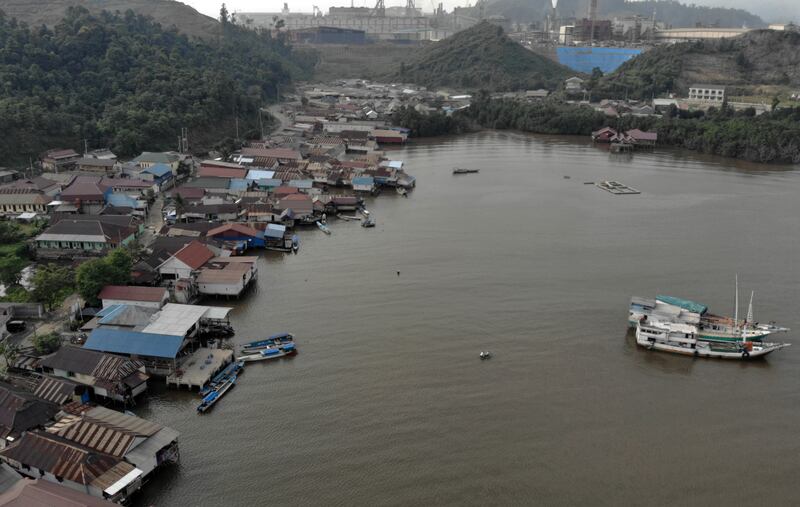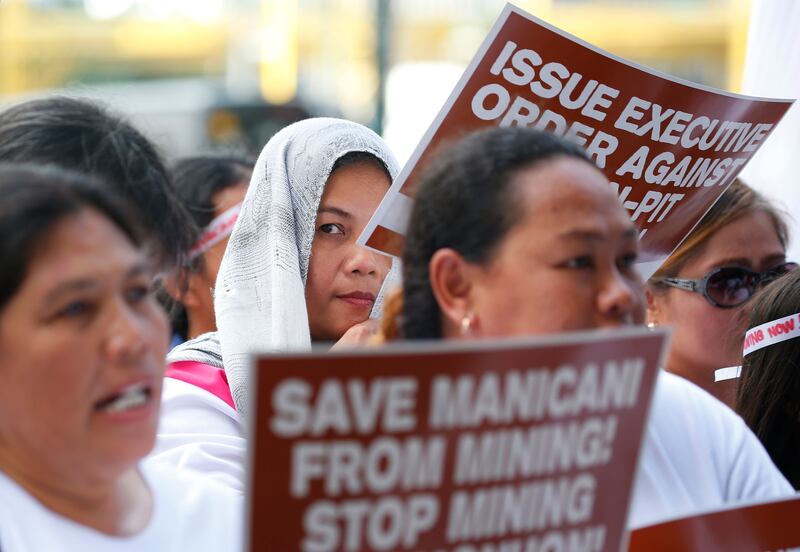Updated at 11:30 a.m. ET on 2023-05-16
Human rights violations and environmental abuses were found in two nickel supply chains in the Philippines and Indonesia, home to more than half of the world’s supplies. They provide batteries to companies including Panasonic, Tesla and Toyota, said a report released Tuesday by a rights research group.
The lack of transparency in electric vehicle battery supply chains means end-user companies must be held responsible, as they can easily distance themselves from the lower-level abuses and avoid addressing associated risks, the London-based Business & Human Rights Resource Centre (BHRRC) said in its report “Powering Electric Vehicles.”
The Rio Tuba Nickel Mining Corp. (Rio Tuba) in the Philippines, and Zhejiang Huayou Cobalt (ZHC) and CNGR Advanced Materials (CNGR), two Chinese companies operating in Indonesia, are responsible for “rising incidents of human and environmental rights violations,” the group said.
Their mining operations have direct adverse effects on local communities, including loss of food security, destruction of surrounding rainforests, water contamination, a detrimental impact on marine life, respiratory and other health-related problems.
The companies also allegedly failed to obtain a lack of free, prior consent from indigenous communities for mining their lands, BHRRC said.
“The human rights abuses in electric vehicle supply chains need to be urgently interrogated and mitigated … and supply chain transparency and accountability must be at the heart of this,” said Pochoy Labog, the BHRRC’s Southeast Asia researcher.
Indonesia is the world’s biggest producer of nickel, a key component for lithium-ion batteries, with 21 million metric tons (4.6 billion pounds) in proven reserves, according to the U.S. Geological Survey.
The Philippines ranks fifth in reserves but is second in nickel production worldwide, with 330,000 metric tons (728 million pounds) in 2022, far behind the 1.6 million tons (3.5 billion pounds) Indonesia produced.
The Resource Centre invited Nickel Asia (of which Rio Tuba is a subsidiary), Toyota and Tesla to respond to the reports alleging human rights and environmental violations of sourcing nickel in Rio Tuba, Palawan, according to the Business & Human Rights Resource Centre report. The companies did not respond.
Meanwhile, Panasonic said the company strives to conduct its business with suppliers in a way that fulfils its social responsibility in areas such as human rights and responsible employment, occupational health and safety, environmental conservation and information security.
‘If Elon Musk believes nickel extraction is eco-friendly, that’s untrue.’
Nickel ore is processed in two main industrial parks in Indonesia, where China is a prominent investor. CNGR operates in the Morowali in Central Sulawesi, while ZHC operates in the Weda Bay on Halmahera Island in North Maluku, as well as in East Luwu and Pomalaa in Sulawesi.
In the end, Tesla and Ford use their products.

Fishing, the profession of most residents, has been severely affected by the sea water becoming too hot, “almost boiling” caused by cooling system exhaust from coal-fired power plants, the report said, while residents also complained of respiratory problems, which they suspect are caused by inhaling dust from the coal unloaded from barges to supply power plants.
In Bahodopi, Central Sulawesi, the report said mining operations were destroying forests and mine tailings spilled into rivers and streams. These contaminated waters run through villages reaching the sea and affecting corals.
Melky Nahar, a national Mining Advocacy Network (JATAM) coordinator, said such activities have caused “enormous ecological damage” in Morowali due to the big industrial area.
“The area is right on the seafront. … If Elon Musk believes nickel extraction is eco-friendly, that’s untrue,” he told BenarNews.
Ruslan Dula, a fisherman in Kurisa Hamlet in Morowali, said residents who have been at sea for decades “can no longer catch fish because the sea is polluted by nickel mining waste.”
“We are very disappointed because the pollution has hampered people from making a living,” he said.
Dedi Askary, chairman of the Central Sulawesi chapter of the National Commission on Human Rights (Komnas HAM), said Morowali industrial park conducted “real practices of environmental crimes” since they do not properly manage “hazardous toxic waste.”
The government should “no longer issue permits for dumping waste into the Morowali sea,” said Muhammad Taufik, director of the Mining Network (JATAM) for Central Sulawesi.
“Marine ecosystems are damaged, and people’s livelihoods are polluted,” he said.
Philippine concessions ‘unsustainable’
Rio Tuba is a Filipino and Japanese mining project in Palawan. The nickel ends up in Panasonic-manufactured electric vehicle batteries, including those used by Tesla.
The report said the mining operations have reportedly had direct negative effects on the health and welfare of affected communities, including water contamination, loss of food security, and the destruction of surrounding rainforests.
Locals reported coughs, respiratory diseases, and skin lesions, which prompted water quality tests for areas surrounding the mine site. The report said the hexavalent chromium, a listed human carcinogen, in one of the sampling river water was greater than 0.05 milligrams per liter (mg/L) – or parts per million – a limit set by the World Health Organization.
Rio Tuba’s initial sampling in December 1996 already showed “escalated values” of hexavalent chromium before the peak of the mining operation, while a 2018-2019 study showed that the carcinogen in surface waters was mostly below the limit of 0.1 mg/L.
Indigenous Palawans have also expressed worries over the looming expansion of Rio Tuba.

In 2017, Manila ordered the closure of 26 open-pit mines, most nickel-related, but they were allowed to resume operations in 2020.
The report said biodiversity loss in Palawan has illustrated how business-as-usual mining practices and levels are no longer sustainable.
Greenpeace Philippines country director Lea Guerrero said mining is unsustainable since “extractive activity itself is highly destructive.”
“We need to change how we use materials as a society,” she told BenarNews. “Many mining concessions are located in islands where many biodiversity and ecosystems are destroyed just to extract minerals.”
She said, for example, spills can immediately reach the seas; in the case of some areas, large swathes of the islands are earmarked as mining concessions, edging out communities that make their living from fishing and farming or tourism.
EV-powered battery boom means more mining.
Electric car markets are seeing “exponential” growth as sales in 2022 exceeded 10 million globally, or 14% of all new cars sold last year, according to a report released last month by the International Energy Agency, a Paris-based intergovernmental organization.
That’s up tenfold from 1 million sold in 2017. Sales will likely grow another 35% this year to reach 14 million, which means almost one in five cars sold this year will be electric, the IEA said.
Indonesia alone is expected to account for half of the global production increase in nickel between 2021 and 2025, according to the IEA.
“As the globe transitions to these cleaner sources of energy, companies must recognize their role in mitigating the endemic human rights issues in E.V. battery supply chains – and must use their leverage to hold suppliers accountable for risks in their value chains,” BHRRC said.
Labog said “the positive momentum towards electric vehicles risks being derailed by these unaddressed abuses.”
“While this shift to greener sources of energy must be encouraged, now is the time to start asking serious questions about the human rights abuses in electric vehicle supply chains,” he said.
“The globe has already begun transitioning to cleaner sources of energy, with decarbonized transport seeing significant investment,” Labog said.
Pizaro Gozali Idrus in Jakarta, Keisyah Aprilia in Central Sulawesi, Indonesia, and BenarNews staff in Manila contributed to this report.
Radio Free Asia (RFA) is a news service affiliated with BenarNews.
Update: This story has been updated to include a link to the report and details about efforts to get comments from companies mentioned in it.
